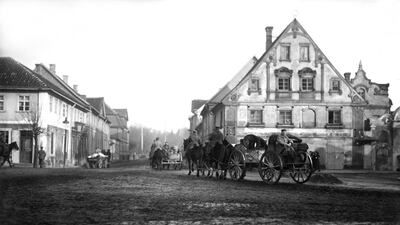For Hemingway, Berlin was “a vulgar, ugly, sullenly dissipated city”, a far cry from his beloved Paris. “After the war it plunged into an orgy that the Germans called the death dance.”
The Empire of the Senses, an impressive debut novel from Los Angeles-born author Alexis Landau, charts the struggles and gradual disintegration of a Berlin family between the wars, during that death dance. The tension begins on the very first page. It is 1914, and Lev Pearlmutter, an assimilated German Jew, leaves his gentile wife Josephine and two children for the Eastern Front. Josephine prays he will be home by Christmas.
But Lev is stationed in Mitau, south of Riga, for the duration of the war, working as a medic and interpreter. Dalliances with “Rubenesque women” in taverns followed by a secret yet full-blown affair with local girl Leah puts Josephine out of his mind. When Lev’s unit is eventually sent to fight in France, he and his colleague Otto desert. Lev returns to his family in Berlin dirty, underweight, heartbroken but alive.
The remainder of the novel plays out largely in Berlin at the tail-end of the 1920s and expands to encompass the rest of Lev’s family. His now-teenage daughter Vicki has her hair bobbed and throws herself into Berlin’s glittering, decadent and at times clandestine nightlife. Lev’s son Franz scorns his sister’s hairstyle and her love of jazz (“Negro music … Primitive and frenetic”) and from this point the writing is on the wall. We learn of his abstemiousness and love of purity; he scowls at a White Russian who “butchered the German language” and takes part in underground meetings led by rabid speakers holding forth on the rebirth of the German Volk – and the necessary elimination of Slavs and Jews. Josephine falls for the doctor tasked with curing her of her inhibitions. Lev attends soirées, mingles with high society and tries to banish Leah from his thoughts.
Landau’s narrative – up until this point a collection of separate tales of mixed fortunes – acquires shape, tautness and giddy momentum after the introduction of two decisive events. First, Franz joins the SA, undeterred by their thuggish anti-Semitism and undaunted by his unexpressed homosexual desires. Second, Leah’s nephew Geza arrives in Berlin and becomes infatuated with Vicki. The novel races towards a gripping climax with outcomes that could go either way: Will Lev be reunited with Leah in New York? Will Geza and Vicki elope to Palestine? Will Franz obey his murderous instincts to protect the sanctity of his family?
The Empire of the Senses feels both original and familiar. Lev's war effort in the East is a refreshing break from the carnage of trench warfare in the West. And while fiction has served up many a wartime romance, the relationship between Lev and Leah, occupier and occupied, takes place under unique circumstances and comes imbued with specific moral and cultural complexities. Less surprising but by no means unwelcome is Landau's recreation of Berlin in the heyday of the Weimar Republic. One character calls it "a mechanical city, a frigid inferno", but everyone else surrenders to its heat and hedonism, not to mention its highly charged political climate.
Landau brings in the percussive march of jackboots and attendant flag-wavers but stops short of Hitler’s rise. As in Christopher Isherwood’s Berlin, the ugly omnipresent roar is consigned to background noise. This is no bad thing, as it means Landau can concentrate more on her characters’ private predicaments. But every now and again we get subtle hints or ironic flourishes as to what dangers lurk around the corner. In 1914, Lev meets a soldier from Dachau who tells him: “It’s a beautiful place.” In 1927, a group of Brownshirts, “as blond and stupid as young bulls, carrying heavy cudgels”, mock a girl in the street. Josephine dismisses it as an isolated incident. Lev disagrees: “Barbarism is contagious.”
Landau clearly knows her history but her novel sporadically suffers from clumsy German. Some of her descriptions are marred by cliché (at least three characters in the first 70 pages have almond-shaped eyes); others sparkle due to their simplicity: “His breath was stale from hunger.”
Where Landau truly excels is with her scope, her ability to guide the Pearlmutters through the years, highlighting national tragedy while homing in on individual plights. The result is an expansive nove,l but also one skilfully in tune with the intricacies of the human spirit.
Malcolm Forbes is a regular contributor to The Review.

